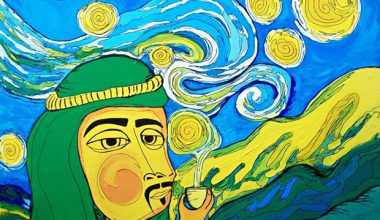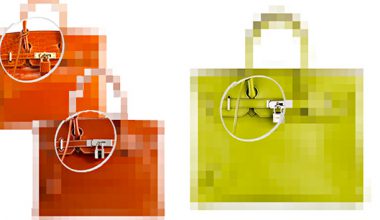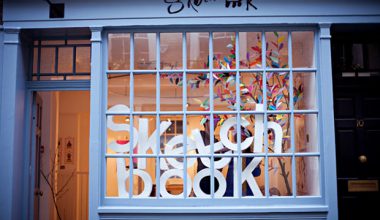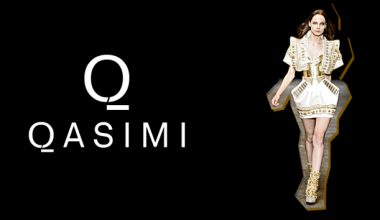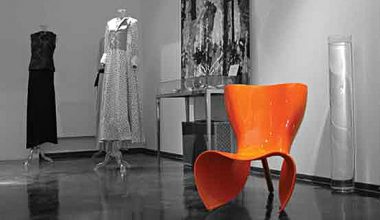Khaleejesque recently connected with founding member and lead of Kuwaisiana, +Aziz, a Khaleeji rock band based in New Orleans, USA. A compound word merging ‘Kuwait’ and ‘Louisiana,’ Kuwaisana produce music that brings together indie rock and world music, and integrate Arabic and English through their signature bilingual lyrics. These rhythmic compositions are both dance-inducing and raise important social topics ranging from bullying to xenophobia.
Kuwaisiana have successfully launched their second album, ‘Chapter 2,’ at the start of 2021, and in this interview +Aziz shares details of the making of this album and what lies ahead for the band.
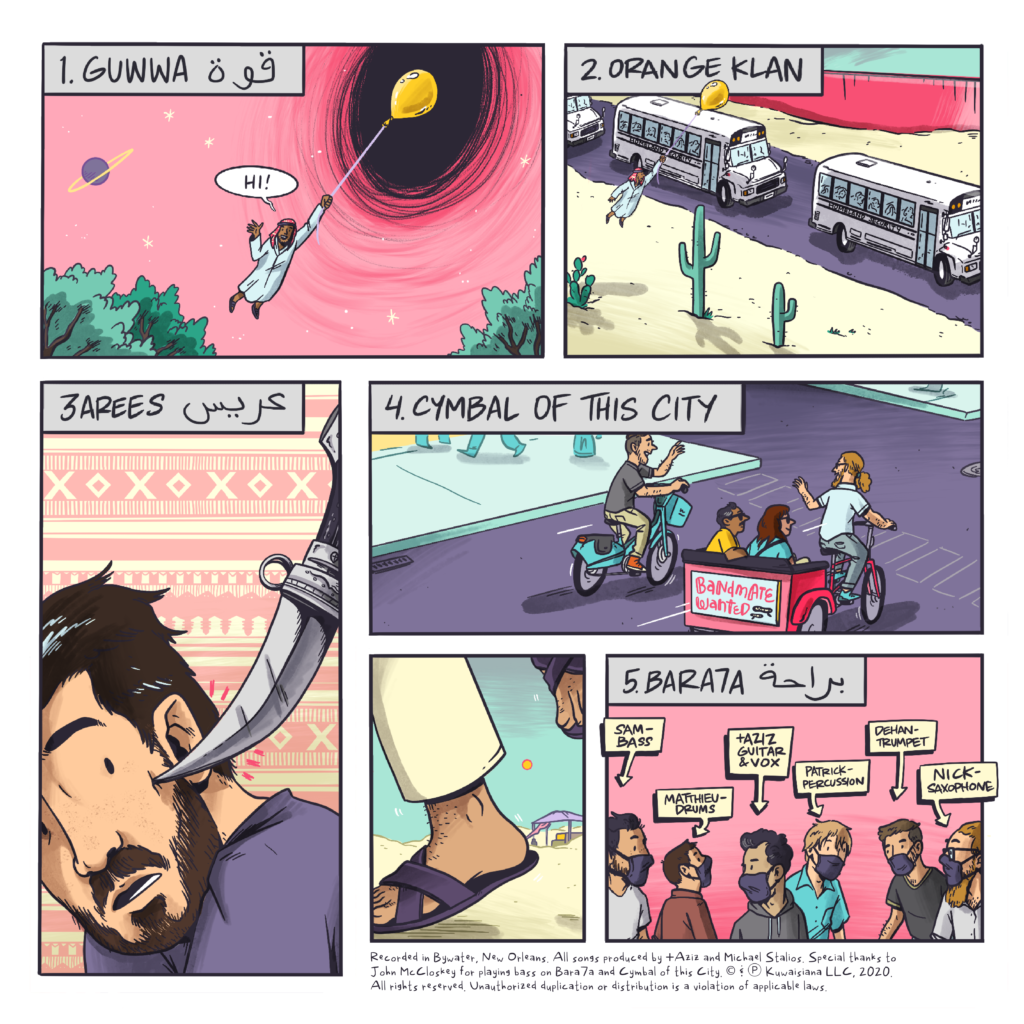
Saira Malik (SM): Where and when did the inspiration for Kuwaisiana stem from?
+AZIZ (+AZ): The idea for the band came together as I was preparing for a job relocation from NYC to New Orleans in 2014. The original idea was to combine the musical heritages of Louisiana and my Kuwaiti roots, but the result is more connected to the musicians who have decided to dedicate themselves to helping me. I wanted to mature from being a songwriter to being a band leader, and part of that meant giving away creative control and letting my bandmates shape the band’s sound.
As you can imagine, Louisiana is significantly slower-paced than New York, so people are more relaxed about playing music together and we’ve had lots of time to try different things out and get smarter about the industry.
SM: Describe the musical aesthetic of Kuwaisiana and what it stands for?
+AZ: I call it Khaleeji Rock. We infuse rock, New Orleanian jazz, and ska. The band’s sound is a colorful contribution to the world of Alternative Arabic Music.
It’s a high-energy, big band, with lots of dynamics and an “epic” sound. We’re at our best playing for a party or a festival. The aesthetic with queues and references to my culture and mother tongue, but it’s really just about having fun and playing with what’s available.
SM: Which artist has greatly influenced your creativity?
+AZ: In terms of rock bands, The Smashing Pumpkins in particular encouraged me to be myself because the lead singer has such a weird singing voice, but it worked so well with those early records. Their songs cover the entire emotional spectrum and they have a vibe without being contained within a genre.
After The Smashing Pumpkins came everyone else. There would be other bands like NIN, The Mars Volta, Sigur Ros, Deftones, and Incubus, that would capture my imagination and help me cope with where I was in life.
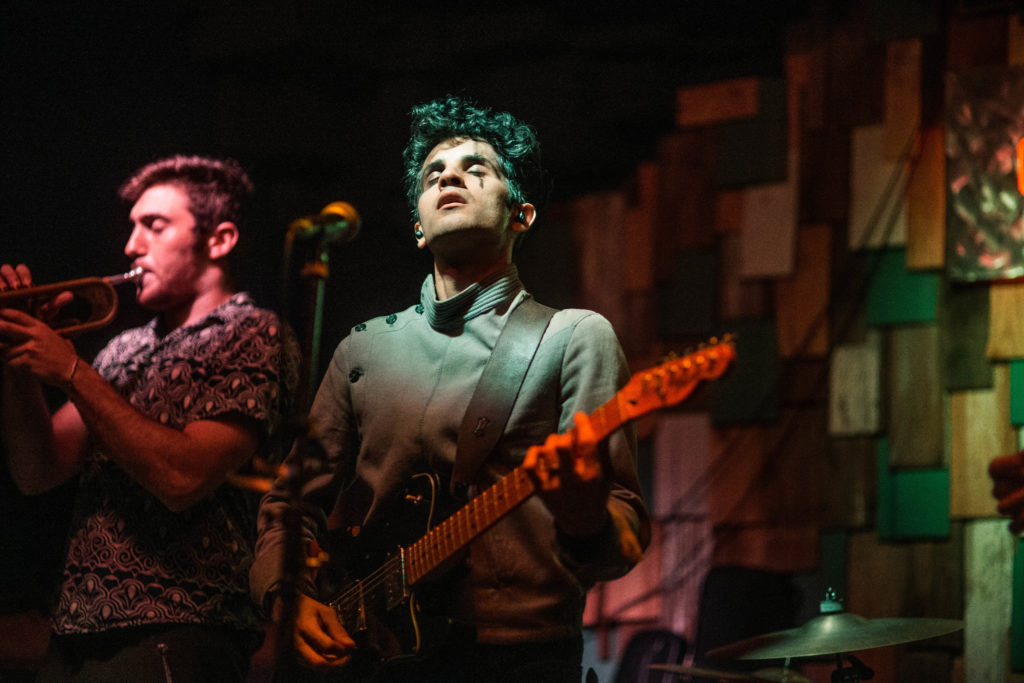
There’s a certain absurdist quality of despair embedded in contemporary Kuwaiti identity that I think warrants a lot of artistic attention. You see it in the work of Sulayman Al-Bassam. I remember experiencing Al-Bassam’s work in high school (an incredibly sharp Kuwaiti playwright who runs a theater company called Sabab Theatre). He did a multilingual reinterpretation of a Shakespeare play around 1999-2000. I went up to him for an autograph after the play, told him about my ambitions and he wrote me a note that read “You will become a rockstar!” I have the notepad in storage somewhere in my parents’ home in Mishref.
SM: How has your music evolved in ‘Chapter 2,’ an album that consists of five very strong tracks?
+AZ: ‘Chapter 2’ is a really cool 22-minute package. Compared to ‘Chapter 1,’ there’s less “genre-hopping” but you’ll find that the tracks, ‘Bara7a’ and ‘3arees’, are more tongue-in-cheek while ‘Guwwa,’ ‘Orange Klan,’ and ‘Cymbal of this City’ are more serious and perhaps even challenging to listen to.
In this release. Topics I sing about range from being bullied, the rise of xenophobia globally, the feeling of moving from the honeymoon phase into the heart of your marriage and you will hear a crystallization of the band’s sound. ‘3arees’ is the only song that has a true Khaleeji rhythm, something we’ve been exploring.
At the end of the day, the band helps me take personal experiences and builds a scaffolding around my rock guitar by mixing my style with jazz, funk, and Afrobeat. One source described it as “ska meets sub-Saharan blues.” Each song is a standalone experience but it all works together nicely now that the band’s identity is more defined.
SM: Can you share the process behind creating each of these tracks that all have an element of powerful social messages and are all bilingual, but remain positive and light-hearted?
+AZ: The process for Kuwaisiana material starts with me sharing the song with Matthieu, the drummer. I use a variety of writing tools (Google Docs, Trello, whiteboard, post-its, etc.) to refine and organize my ideas.
Typically, if Matthieu is into what I show him, then we explore it.
- ‘Guwwa’ was born out of an experience where I burned a bridge and started to demonize myself. We eventually patched things up, but the song was written during a time when the person I wronged was not responding.
- ‘Orange Klan’ This one has freaky energy because it’s about white supremacy and the xenophobia that’s been enveloping the world. I love the juxtaposition of a depressive-manic verse against the dancy-bright chorus. To me it reflects the extreme ups and downs of our time.
- ‘3arees’ is a song about that moment where you crossover from the Honeymoon phase into settling in with someone, building routines and growing domesticated (marriage!).
- ‘Cymbal of this City’ was written during the years when I first came to the US to study and felt very isolated. It’s really come a long way. Once I introduced the song to the band, we were able to elevate it with a driving force and a catchy hook! Probably the only true “hook” on the EP actually.
- ‘Bara7a’ is our single. This one started with the guitar riff on the verse. It came out of my hands very suddenly when we were practicing and we all really liked it.
SM: With band members from different cultural backgrounds how do you find the synergy to work so seamlessly together and give us music that appeals to a global audience?
+AZ: My creative path is in many ways defined by my sensitivity to the parallels that exist between Khaleeji and American culture, but Kuwaisiana in particular is anchored in my relationship with Matthieu, the band’s drummer, a Frenchman who’s my age. Once I started working with him, everything began to gel. Interestingly, both of our stories are journeys of self-exile and sacrificing the comforts of being home for the pursuit of music.
Matthieu and I will usually start by finding a balance in the song structure. His approach is finding the minimum drumming required to establish a groove, leaving the maximum timbales, bongos, darbuka, etc. Our horn players Dehan Elcin (from Istanbul) and Nick Ferreirae (from San Diego, CA) play with a number of NOLA bands, but they write their own horn parts in Kuwaisiana, which support my vocals substantially and rip into solos when we give them the runway.
Matthieu brings a taste of ska, reggae, 2nd line, and Caribbean rhythms grooves, which has become central to the band’s identity. We all meet in the middle and that’s where the band’s sound sits
SM: Tell us about the one song in Chapter 2 that resonates with you the most?
+AZ: ‘Guwwa’ came from a very real and recent experience. I love the way the music can carry Arabic and English and the song is really fun to dance to. It’s a very indie rock sounding type of song, but still has elements of ska, jazz and “world music.”
SM: You are able to capture the spirit of your song ‘Bara7a’ in a playful and relatable music video, can you tell us a little about it was planned and executed so well?
+AZ: We wanted to embrace that super popular aesthetic on Instagram (with the pastel pinks and vivid greens) and use it to accentuate different visual metaphors. The music video is grounded in the band’s performance of the song and we have vignettes to explore and show the emotions driving the song. It’s a really cool and well-explored technique I would say.
I wanted something whimsical and filled with punchy metaphoric visuals. If you’ve seen Suede’s Beautiful Ones or Fazerdaze’s Lucky Girl, you’ll see that there are many videos that embrace this poetic style.
SM: What has the reaction been to the new album and are you satisfied with it?
+AZ: Yes, the reviews have been good. The local press in New Orleans has been great to us. Museland Records, out of Bahrain, also gave me some really great feedback. We had a great premiere for Bara7a with Under the Radar.
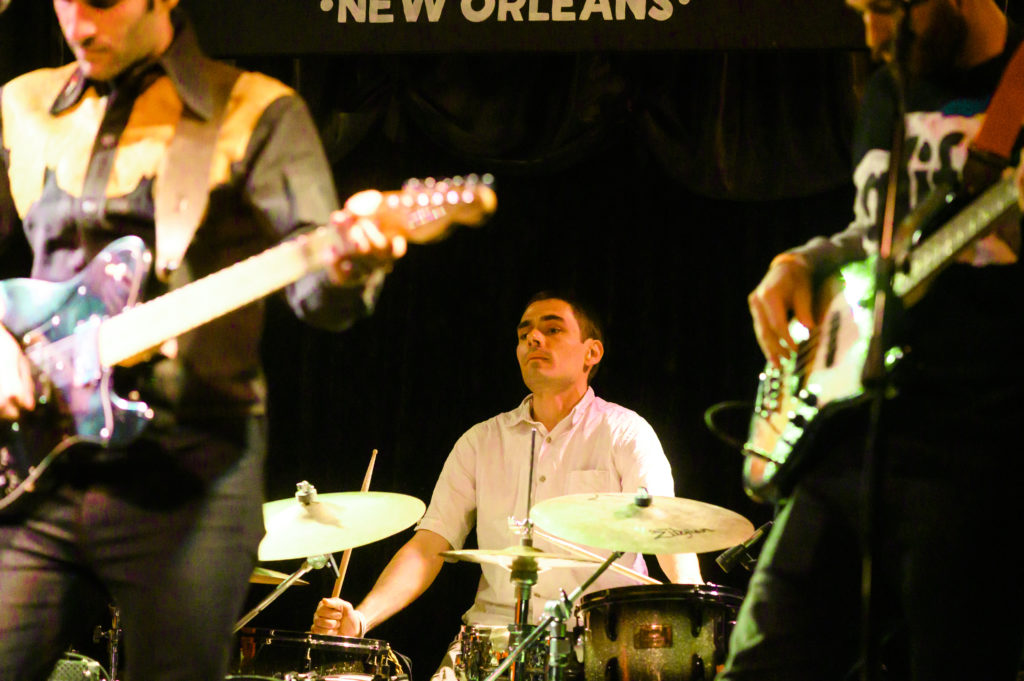
SM: The best way to support your band and access your music is through Patreon. What are some of the positive reasons to join this platform?
+AZ: The fact that people are willing to make monthly contributions so that I can continue focusing on my music is incredibly motivating to me. This is especially generous given all the numerous humanitarian and environmental catastrophes happening around us.
There’s no better way to support and sustain an artist you believe in than to go direct. It’s as simple as that. My Patreon dollars go towards production costs, practice space rental, and other costs directly associated with my music. If you believe in my voice and my ability to foster cross-cultural understanding, please consider becoming a patron.
I have 4 reasons to give, outlined!
- Making this music helps combat widespread misunderstandings of Arab and MENA cultures (to foster cross-cultural understanding). There’s a diversity of thinking and identities even within Kuwait itself. Funding people like me helps the world get closer to that realization.
- You are amplifying 3rd culture music: I represent a different side to our culture than the megastars. Some people hate code-switching, others connect with it and see its importance. The goal of this music is to bridge experiences and bring people together, whatever your background or what you speak.
- In return for your support, you'll get thoughtful rewards, my eternal gratitude & a highly personalized experience of what goes on behind the scenes.
- People on my Patreon will be the first to receive our vinyl and merch as it’s being made.
SM: What do you aspire for the band’s future and what’s next for Kuwaisiana?
+AZ: Honestly, I’m just taking it one day at a time. As I write these answers, there are roughly two 9/11’s happening daily in the US.
I am writing a lot and focusing on addressing the new challenges for a Post-COVID reality. Patreon is part of my solution. For Kuwaisiana, I meet with my drummer 2-3 times a week. We get together with the bassist and saxophone player once a week too. Currently, we’re working on 5 new tracks for Chapter 3, which we’ll be recording this year.
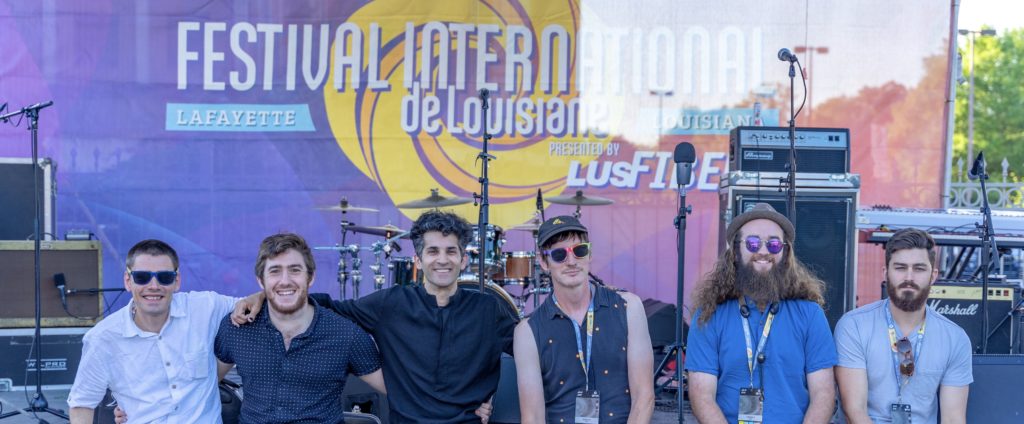
+Aziz – vocals/guitar, Kuwait 🇰🇼 | Matthieu – Drums, France 🇫🇷 | Sam Levine – Bass, NJ 🇺🇲 |
Dehan Elçin – Trumpet, Turkey 🇹🇷 | Nick Ferreirae – Sax, San Diego 🇺🇲 | Patrick Driscoll – Hand percussion, Chicago 🇺🇲
For more on Kuwaisiana visit their Website or Instagram
And you can stream their music on
Spotify | Apple Music | Soundcloud | Bandcamp
Words: Saira Malik and +Aziz
Images: Courtesy of +Aziz


